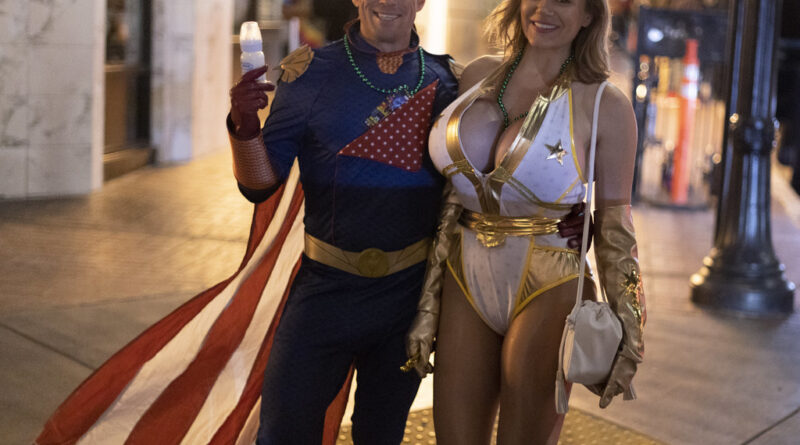The Boys
The Boys: A Dark Mirror Reflecting Society’s Flaws
Introduction
In the realm of superheroes, where capes and masks often symbolize hope and justice, “The Boys” emerges as a stark departure from the norm. Garth Ennis and Darick Robertson’s graphic novel series, adapted into a hit television show by Eric Kripke, challenges the traditional superhero narrative. It peels back the glossy exterior to reveal the flawed, corrupt, and morally ambiguous nature of both heroes and the society that worships them. In this blog post, we will delve into the complex world of “The Boys,” exploring its themes, character depth, social commentary, and the impact it has had on the superhero genre.
The Dark Side of Superheroes: Flawed Icons and Antiheroes
At first glance, superheroes in popular media are often portrayed as beacons of virtue, embodying ideals of justice, courage, and sacrifice. However, “The Boys” shatters this illusion, depicting superheroes as deeply flawed individuals who exploit their powers, fame, and influence. These characters are far from the noble paragons society believes them to be; they are often egoistic, ruthless, and morally bankrupt. The series explores the consequences of unchecked power, celebrity culture, and corporate greed, presenting a scathing critique of modern society’s obsession with image over substance.
Complex Characters: Shades of Gray in a Black-and-White World
One of the show’s greatest strengths lies in its character development. Each member of “The Boys” and “The Seven” (the superhero group in the series) is multi-dimensional, struggling with personal demons, traumas, and ethical dilemmas. From Billy Butcher’s vengeful quest against supers to Homelander’s twisted god complex, the characters are not simply heroes or villains; they are deeply human, with layers of motivations and flaws. This complexity adds depth to the narrative, forcing viewers to question their allegiances and moral compass, blurring the lines between right and wrong.
Social Commentary: A Mirror to Real-World Issues
“The Boys” serves as a powerful social commentary, tackling a myriad of contemporary issues. From corporate manipulation and media influence to political corruption and the abuse of power, the series fearlessly delves into societal problems often swept under the rug. It reflects the cynicism and disillusionment prevalent in today’s world, unearthing uncomfortable truths about human nature and the systems we have created. Through the lens of superheroes, the show critiques the very fabric of society, challenging viewers to confront uncomfortable realities.
Sexuality and Gender: Breaking Stereotypes and Taboos
“The Boys” boldly addresses sexuality and gender in ways rarely seen in mainstream superhero narratives. The series includes LGBTQ+ characters whose sexual orientations are not defined by stereotypes but rather reflect the diverse spectrum of human experiences. Moreover, it tackles issues of sexual assault, consent, and misogyny, shining a light on the toxic masculinity prevalent in both the superhero genre and society at large. By addressing these topics head-on, “The Boys” fosters important conversations about representation, consent, and gender equality.
Violence and Catharsis: The Role of Graphic Imagery
“The Boys” is unabashedly violent and graphic, showcasing intense scenes of gore and brutality. While this approach might initially shock viewers, it serves a purpose beyond mere shock value. The series uses violence as a tool for catharsis, allowing audiences to witness the raw consequences of unchecked power and injustice. It challenges viewers to confront the uncomfortable realities of violence, desensitization, and desensitization within society. In doing so, “The Boys” provides a visceral, emotional impact that lingers long after the screen fades to black.
Conclusion: A Dystopian Mirror Reflecting Our Reality
“The Boys” stands as a bold, unapologetic exploration of the darker facets of humanity and the superhero genre. By subverting traditional tropes and exposing the flaws of both superheroes and society, the series forces viewers to confront uncomfortable truths about the world we live in. It challenges us to question the narratives fed to us, urging us to look beyond the masks and capes to see the flawed individuals beneath. In a world increasingly obsessed with idealized images and superficial narratives, “The Boys” serves as a stark reminder that real heroism lies not in perfection but in acknowledging our flaws, challenging injustice, and striving for a better, more equitable world. Through its dark mirror, “The Boys” reflects a dystopian reality, offering viewers a chance to confront the shadows lurking beneath the surface and, perhaps, find the strength to change the narrative for the better.
